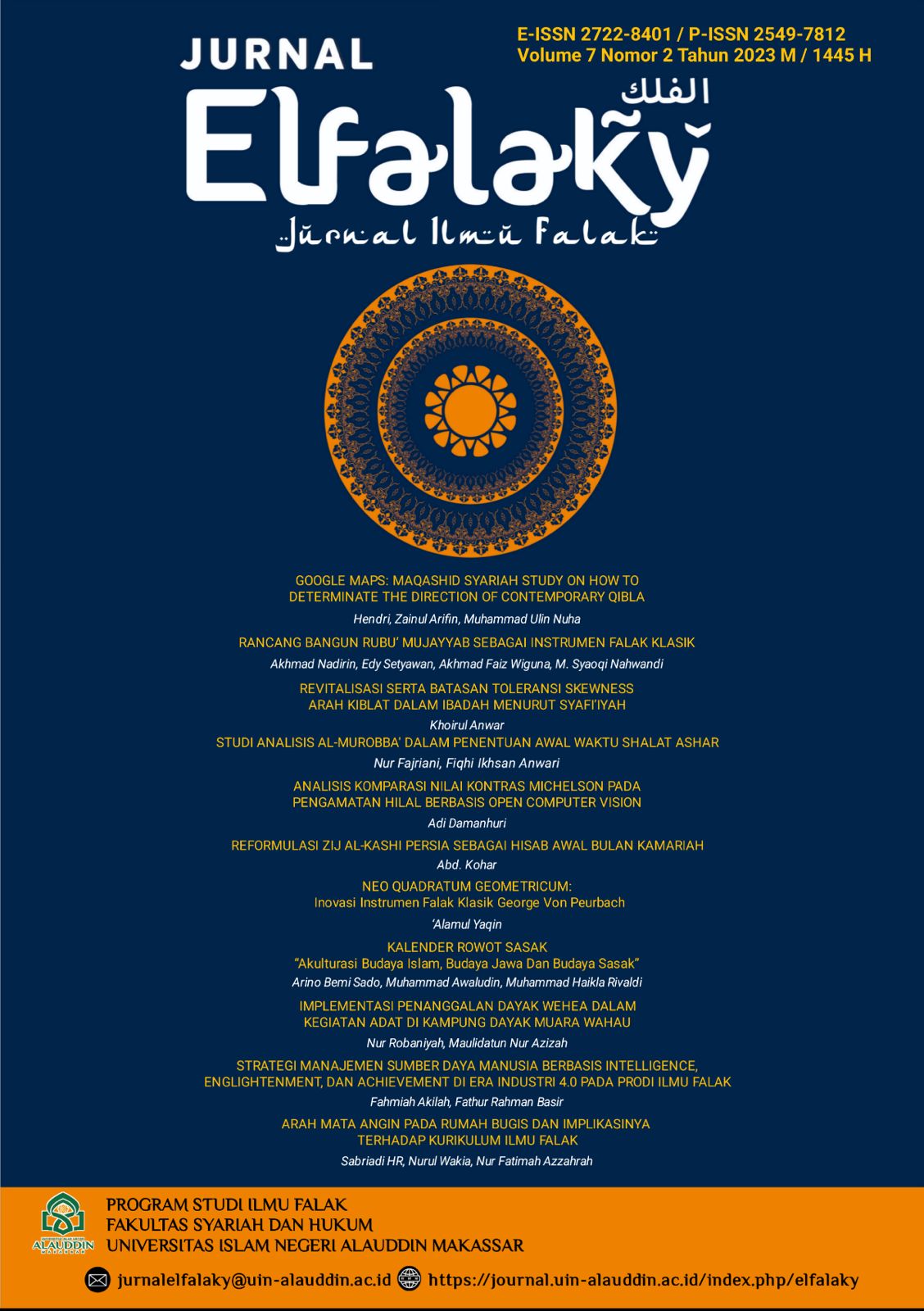REFORMULASI ZIJ AL-KASHI PERSIA SEBAGAI HISAB AWAL BULAN KAMARIAH
Abstract
Al-kashi was a Persian astronomer who was nicknamed the second Ptolemy. The important work is zij named zij khaqani. This Zij has a deficiency in terms of the epoch or reference calculation in 851 Persia or November 16, 1481 M. This Zij has the potential to be developed so that it can be used as the initial reckoning of the lunar month. This research was conducted by Qualitative methods. Techniques for collecting data using literature. The problem the author wants to know is 1). What is the zij al-Kashi compilation algorithm? 2) How to reformulate zij al-Kashi as the initial reckoning of the Kamariyah Month? 3) how is the accuracy of Zij al-Kashi post reformulation as the initial reckoning of the month of Kamariyah? This research produces first, zij al-kashi uses Ptolemy's theory to correct the movement of celestial bodies. Al-kashi still considers the movement of celestial bodies in the form of circles instead of ellipses. Second, Reformulation is carried out by renewing the epoch, the dating system, correction for six months of movement disorders. Third, Contemporary reckoning in this case is used by Jean Meeus. Accuracy tests were carried out in critical years for the initial determination of ramdahan, Syawal Dzulhijjah. These years are 1427, 1428, 1432, and 1439. 14 The difference in the height of the modified zij al-Kashi hilal with contemporary reckoning is at intervals of 3-11 minutes of arc. The smallest difference is 3 minutes of arc and at most 11 minutes of arc.
References
Adams, Jhon, Couch Lectures on The Lunar Theory, London : Cambridge University Press, 1900.
Andrew, Precious, The Mathematics of the epicycloid : a historical journey with a modern perspective, Thesis Master of Science Mathematics The University of New Mexico Agustus 2009.
Anugraha, Rinto, Mekanika Benda Langit, Yogyakarta: UGM, 2012.
Azhari, Susiknan, Hisab dan Rukyat, Yogyakarta: Pustaka Pelajar, 2007.
_____________, Ilmu Falak Teori dan Praktek, Yogyakarta : Suara Muhammadiyah, 2004.
_____________, Ensiklopedi Hisab Rukyat, Yogyakarta: Pustaka Pelajar, 2012.
______________, Selayang Pandang Hisab Rukyah, Jakarta: BIMAS Islam, 2004.
Badan Hisab dan Ru’yah Departemen Agama, Almanak Hisab Rukyah, Jakarta : Proyek Pembinaan Badan Peradilan Agama Islam, 2010.
Bradley, Michael J., The Age of Genius 1300 to 1800, New York : Chelsea House, 2006.
Dershowitz, Nachum, Calendrical Calculation, New York : Cambridge University Press, 2008.
Depag RI, Pedoman Perhitungan Awal.
Fitzpatrick, Richard, A Modern Almagest, Austin : University Of Texas, 2004.
Hockey, Thomas, Biographical Encyclopedia of Astronomer, New york : Springer, 2007.
Izzudin, Ahmad, Fiqih Hisab Rukyat, Jakarta: Erlangga, 2007.
Jamshid Ghiyat al-Din al-Kashi, Nuzhat al-Hadaiq, tt.
Juli Rakhmadi Butar-Butar, Arwin, Khazanah Astronomi Islam Abad Pertengahan, Purwokerto: UMP Press, 2016.
Kennedy, Edwart Stwart, The Planetarium Equatorium of Jamshid Ghiyath al-Din al-Kashi, New Jersey : 1960.
MacDougal, Douglas W., Newton’s Gravity, New York: Springer, 2012.
Masroeri, A. Ghazalie, Pedoman Rukyah, Lajnah Falakiyah PBNU, 2006.
Meeus, Jean, astronomical algorithm, Virginia: Willmann-Bell, 1991.
Motenbruck, Oliver, Astronomy on the Personal Computer, New York: Springer, 2000, hlm. 151.
Nashirudin, Muhammad, Kalender Hijriah Universal, Semarang : El-Wafa, 2013.
Narrien, Jhon, An Historical Account of the origin and Progress of Astronomy, London : Baldwin, 1833.
Roncoli, Ralph B., Lunar Constants and Models Document, California : California institute Jet Propulsion Laboratory, 2005.
Sabiq, Fairuz, Telaah Metodologi Penetapan Awal Bulan Kamariah di Indonesia, Tesis Pascasarjana IAIN Walisongo Semarang, 2007.
Sadiq, Sriyatin, Makalah Pelatihan dan Pendalaman Ilmu Falak, Pascasarjana IAIN Walisongo Semarang tanggal 10-11 januari 2009.
Shadiq, Sriyatin, Perkembangan Hisab Rukyat dan Penetapan Awal Bulan Qamariyah dalam Menuju Kesatuan Hari Raya, Surabaya: Bina Ilmu, 1995.
Vallado, David A., Fundamentals of Astrodynamics and Applications, United States: Microcosm Press, 2001.
• Jurnal
Aaboe, Asger, Al-kashi Iteration Method for the determination of sin 1°.
Anugrah Reskiani dan Rahman Subhan, Analisis Visibilitas Hilal Sebgai Acuan Penentuan Awal Bulan Kamariah, dalam Jurnal El-Falaky Vol. 6. No. 1 (2022).
Azarian, Mohammad K., Al-Risala al-Muhitiyya: A Summary dalam Missouri Journal of Mathematical Science Volume 22 no 2 Spring 2010.
____________________, Meftah al-Hesab: A Summary dalam Missouri Journal of Mathematical Science Volume 12 no 2 Spring 2000.
Bagheri, Muhammad. A Newly Found Letter of Al-Kashi on Scientific Life in Samarkand alam, Artikel No. HM962145 dalam Jurnal Historia Matematica volume 24 tahun 1997.
Irfan Anwar dan Mahyudin Latuconsina, Studi Komparasi Kriteria Awal Bulan Kamariah Kalender Fazilet dan Kriteria Mabims, dalam Jurnal El-Falaky Vo. 7 No. 1 (2023).
Kennedy, Edwart Stwart, On The Contents and Significance of the khaqani Zij By Jamshid Ghiyath al-Din n al-Kashi, Islamic Mathematics and Astronomy Volume 84, 1998.
___________________, A Fifteenth-Century Planetary Computer: al-Kashi’s “Tabaq al-Manatiq” I Motion of the Sun and Moon in Longitude dalam Chicago Journals: History of Science Society Vol. 41, No. 2 (Juli 1950).
__________________, A Fifteenth-Century Planetary Computer: al-Kashi’s “Tabaq al-Manatiq” II Longitudes, Distances and Equations of the Planet dalam Chicago Journals: History of Science Society Vol. 43, No. 1 (April 1952).
Jan P. Hogendijk, al-Kashi Determination of π to 16 decimals in an old manuscript, Germany : Strauss Gmbh, 2009.
Mitkova, Maya, al-Kashi Doubbed as Second Ptolemy, dalam Arab Times tanggal 22 November 2013 hari Jumat.
Pederson, Olaf, review the book the planetary equatorium of jamshid ghiyath al-din al-kashi with translation and commentary by E.S. Kennedy dalam journal of the American Oriental Society, Vol. 83, No. 3 (Aug. – Sep., 1963).
• Website
https://latitude.to/to/articles-bycountry/tr/turkey/247/constantinopel.html diakses pada tanggal 10 Juni 2019 hari Selasa jam 15.14 WIB
Jet Propulsion Laboratory (NASA), http://ssd.jpl.nasa.gov/ diakses pada hari sabtu 18 Mei 2019 pukul 20.00 WIB.





